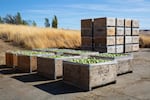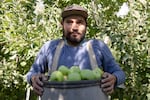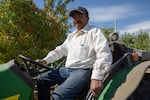The federal bankruptcy court in Portland was almost empty when apple farmer Richard Blaine walked in. It was mid-October and harvest was in full swing on his orchards in Oregon and Washington. As workers plucked Granny Smiths and Golden Delicious from his trees, Blaine shifted in his seat and absorbed the bankruptcy hearing playing out around him.
Richard Blaine — friends call him “Rick” — and his wife, Sydney Blaine, have run Avalon Orchards since 1974, growing apples, pears and cherries. He said the last five years have been a “perfect storm.”
It's partly thanks to President Donald Trump that the Blaines have access to a kind of streamlined bankruptcy protection that's meant to help family farmers reorganize and keep farming. But it's partly thanks to the president's trade wars that they need it.
The farmers
The Blaines have been married for 52 years. He was a schoolteacher when they bought her grandfather’s farm in the Upper Hood River Valley. They learned by doing and over the years they expanded Avalon Orchards to five farms in Oregon and Washington.

Sydney, left, and Richard Blaine at Avalon Orchards in Sundale, Wash., Monday, Oct. 7, 2019. The Blaines have run Avalon since 1974. They hope to reorganize and continue farming after filing for Chapter 12 bankruptcy protections due to a variety of financial challenges, including tariffs.
Kate Davidson / OPB
Rick Blaine said now, at age 72, he can drive by an orchard at 50 mph and tell if it’s well tended. He and his wife are hands-on farmers.
“Mother Nature does almost all of it. But once in a while, if you bend a limb here or bend a limb there, and you do it often enough, the tree will produce lovely fruit,” he said.
“I love the harvest,” Sydney Blaine said. “I’m outdoors all day long and especially when the weather is gorgeous, it’s just a beautiful outdoor life.”
Their daughter Heather Blaine is Avalon Orchards’ general manager. She said watching her parents go through this perfect storm, culminating in Avalon’s bankruptcy, has made this the hardest year of her life.
“I cannot even tell you how many tears have come out of my eyes,” Heather Blaine said. “And I wake up in the morning with stomach aches wondering how they are going to end their adventure in this livelihood we’ve had since 1974.”
The storm starts in 2014
When experienced farmers like the Blaines file for bankruptcy, it’s seldom because one thing went wrong. It’s usually because they’ve weathered a series of blows, which now include tariffs. In fact, the Blaines’ account of their perfect storm shows just how tied Northwest apples are to the whims of geopolitics.
They say it all started in 2014, with an event thousands of miles away that changed the global flow of apples.

Bins of apples sit in the sun at Avalon Orchards in Sundale, Wash., Monday, Oct. 7, 2019.
Kate Davidson / OPB
After Russia seized and then annexed Ukraine's Crimean Peninsula, Western nations imposed sanctions. Russia responded with a sweeping ban on imports from those countries, including apples. One of the affected countries, Poland, was a huge apple exporter and Russia was its biggest customer. Without access to Russia, European apples have been muscling into other markets where American fruit is also sold.
"The impact has been intense and right now immeasurable," said Mark Powers, president of the Northwest Horticultural Council. "European apples that used to be sold in Russia are now being sold throughout the Middle East, in India and Southeast Asia as a result of those sanctions. We're losing market share as a result."
But the storm was just getting started.
In November 2014, a severe freeze killed 50-60 acres of Avalon’s fruit trees and damaged many more. Rick Blaine said it cost hundreds of thousands of dollars to replant the trees, which would take years to fully produce.

Victor Covarrubias holds a basket of Granny Smith apples at Avalon Orchards in Sundale, Wash., Monday, Oct. 7, 2019.
Kate Davidson / OPB
Add to that a monthslong labor conflict between dockworkers and shippers that bled into 2015 and turned some West Coast ports into parking lots. "The labor dispute has slowed imports and exports to a crawl at 29 West Coast ports," CBS news reported at the time. Washington growers export about a third of their apples, but the slowdown backed up the region's entire apple supply chain. It cost producers dearly.
So that was the initial storm.
The perfect storm
“In 2015 and '16, we started to recover,” Rick Blaine said.
Then, in 2018, President Trump imposed tariffs on imported steel and aluminum and the storm turned into a perfect storm. As the president’s trade wars escalated, the Blaines’ biggest export markets retaliated. No. 1 Mexico, no. 2 India, and no. 6 China all imposed or eventually raised tariffs on American apples. As foreign markets shrunk, those apples stayed in the U.S., depressing prices here.
“It’s so unnecessary and it’s destroying our livelihood,” said Sydney Blaine. “The tariffs are destroying the markets and they’re destroying them for a long time into the future.”
Even if countries later drop tariffs, as Mexico did, it takes time to rebuild those markets.
"It's sort of like if you're sitting in a backup on the interstate and you're wondering why has the traffic come to a screeching halt?" said Jim Bair, president and CEO of the U.S. Apple Association. "Well the accident that caused the backup may have been cleared off to the side of the road two hours ago, but it takes a long time to build back up to the same velocity that you were at. And that's true of trade."

Vilmer Alcantar drives a tractor hauling bins of Granny Smith apples at Avalon Orchards' farm in Sundale, Wash., Monday, Oct. 7, 2019. Alcantar is the foreman here and has worked for Avalon Orchards since 1983.
Kate Davidson / OPB
Over the past decade, the Blaines made business choices that also shaped their financial course. That includes planting some apples that have lost appeal in America, but are prized in Asia.
“Much of our efforts, including planting Red Delicious, even though we know it wasn’t domestically acceptable, was designed to be exported to India. The people of India and China and Southeast Asia, they really enjoy red fruit. And I think that’s terrific,” he said.
India now has a 70% tariff on U.S. apples.
“If you can’t sell your fruit that’s designed for export, then you have failed,” Rick Blaine said.
The Blaines say they have never missed a loan payment in their lives. Still, according to court documents, Columbia State Bank looked at their losses and declined further funding for this year’s crop. It also found them in covenant default on a multimillion-dollar loan, basically alleging they’d failed to maintain enough equity in their operations. A lawyer for the bank said he was unable to comment.
The Blaines say they’ve sold a house and one of their five orchards to raise cash. They wrapped up harvest a few days ago. Now they have to wrap up their bankruptcy case.
Chapter 12
Six months ago, Avalon Orchards wouldn’t have been able to seek the streamlined protections of Chapter 12 bankruptcy. But on Aug. 23, President Trump signed a law expanding the number of family farmers eligible for that relief. The Family Farmer Relief Act more than doubled the amount of debt a farm can have and still qualify for Chapter 12, without being forced into a more onerous proceeding. The debt cap is now $10 million.
Richard and Sydney Blaine had been waiting for that signature. Five days later, they filed for Chapter 12 protection for Avalon Orchards. Theoretically, they should be able to reorganize and keep farming, even if operations are smaller.

Richard Blaine walks through his orchard in Sundale, Wash., Monday, Oct. 7, 2019. A number of financial forces, including tariffs, forced the family to file for Chapter 12 bankruptcy protection.
Kate Davidson / OPB
Daughter Heather Blaine is grateful her parents could still retire “just nicely.” She said it makes them feel like it wasn’t all for naught. Still the rough ride since 2014 has made the 51-year-old general manager worry about her own future.
“I have a great life, but I’ve always considered the land my 401(k),” she said. “When you put basically all your money into dirt, it gets a little stressful when times become very, very tenuous.”
Those tenuous times, and the changes to Chapter 12, likely mean more family farmers affected by the storm of geopolitics will seek bankruptcy protection as time goes on.


